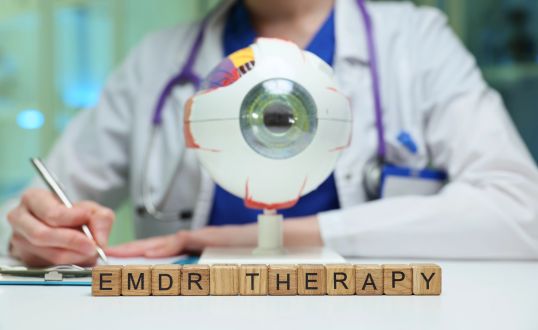EMDR vs. Talk Therapy: Which Is Right for You?


When you’re ready to feel better – really better – you’ll eventually land at a crossroads: Which kind of therapy should you choose?
There’s no shortage of options out there, but two of the most well-known and effective approaches for anxiety, trauma, and stress-related issues are EMDR (Eye Movement Desensitization and Reprocessing) and traditional talk therapy. Both are rooted in science, and both can lead to meaningful change. But they take very different paths to get there.
If you’ve ever wondered whether you need to spend months analyzing your childhood or whether a more structured, neurological approach might be right for you, this breakdown will help you figure it out.
Let’s start by looking at what each method involves – and who tends to benefit most.
What Is Talk Therapy?
Talk therapy, also called psychotherapy or counseling, is probably what comes to mind when you imagine a traditional therapist’s office. You sit down (on a couch, or maybe just a chair), and you talk. About your day. Your past. Your worries. Your relationships. The goal is to explore your thoughts, emotions, and behaviors with a trained professional, who helps you make sense of it all and begin to shift harmful patterns.
There are several forms of talk therapy – Cognitive Behavioral Therapy (CBT), psychodynamic therapy, humanistic therapy, etc. – but most involve some form of guided conversation where you uncover insights over time.
If you’re someone who processes emotions through dialogue, or if you’re seeking a long-term relationship with a therapist to explore different areas of life, talk therapy can be a great fit. It’s especially helpful for issues like:
- Generalized anxiety
- Relationship struggles
- Life transitions
- Depression
- Grief
- Ongoing stress
But when trauma is at the root – especially if that trauma is stuck in your body in a way that talking alone can’t reach – EMDR may offer something different.
What Is EMDR Therapy?
EMDR stands for Eye Movement Desensitization and Reprocessing. It’s a structured therapy that helps your brain reprocess traumatic memories so they lose their emotional charge. You don’t just talk about your trauma – you actively rewire how your brain responds to it.
EMDR uses bilateral stimulation (typically rapid eye movements, but also tapping or sounds) while you focus briefly on a traumatic memory. This dual attention process is thought to help your brain “unstick” and reprocess the event the same way it does during REM sleep.
“Because EMDR therapy is believed to unfreeze your brain’s ability to process memories effectively, for some clients, change comes more quickly than just talking forever about it,” psychotherapist Andrew Kushnick points out.
In other words, if you’ve felt stuck in a loop of talking about the same pain over and over without much progress, EMDR could be the pattern-breaker you’ve been waiting for.
EMDR is particularly effective for:
- Post-traumatic stress disorder (PTSD)
- Childhood trauma
- Panic attacks
- Phobias
- Flashbacks
- Complex grief
- Medical trauma
- Emotional abuse or neglect
But it’s not just for people who’ve experienced major trauma. EMDR can also help with the more “invisible” types of pain – like being repeatedly criticized by a parent, or never feeling safe or supported as a child. These experiences leave emotional imprints that your brain might still be treating like a threat today.
The beauty of EMDR is that it doesn’t require you to retell your story in detail. You don’t have to explain every memory or dig through years of background. Instead, you focus on key emotional moments and let your brain do what it naturally wants to do: resolve and heal.
What’s the Time Commitment?
Talk therapy can be open-ended. You might go weekly for six months or six years, depending on your goals and preferences. The process tends to unfold gradually, especially if you’re tackling deep-rooted patterns.
EMDR, on the other hand, is often shorter-term. Many people experience significant relief after just a handful of sessions – sometimes as few as 6 to 12. That doesn’t mean the work is easy or instant, but it’s typically more focused and time-limited than traditional therapy.
That said, a good therapist will help you assess your needs, whether that means blending EMDR with talk therapy or choosing one based on where you are in your healing process.
Which One Is Right for You?
Choosing between EMDR and talk therapy depends on your goals, your comfort level, and the kind of healing you’re looking for.
Choose Talk Therapy if:
- You enjoy reflecting and processing through conversation
- You want a supportive space to explore multiple life issues
- You’re not ready to dive into trauma-specific work just yet
- You value building a long-term relationship with a therapist
Choose EMDR if:
- You’ve talked about the same pain for years and still feel stuck
- You want to target and resolve specific memories or trauma
- You’re open to structured, nontraditional techniques
- You’re looking for faster relief from trauma-related symptoms
It’s worth pointing out that you can also do both. Many therapists integrate EMDR into their broader talk therapy practice, giving you the flexibility to alternate between processing in conversation and doing deeper neurological work.
Adding it All Up
Therapy isn’t about one method being “better” than another – it’s about what works best for you. You deserve healing that fits your personality, your goals, and the way your brain processes pain.
If you’ve been spinning your wheels in traditional therapy, or if you’ve been avoiding therapy altogether because you don’t want to “just talk about your feelings,” EMDR might be worth exploring. And if you crave connection, reflection, and a slow, steady path through your story, talk therapy might be the steady anchor you need.
Both paths are valid and have the potential to change your life. The key is choosing the one that helps you move forward.





